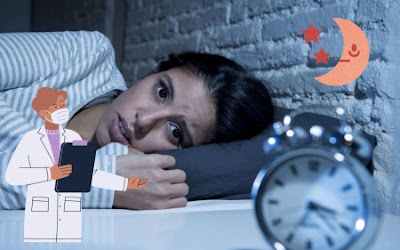A persistent problem that affects a
lot of people worldwide is insomnia. Several things, including stress, anxiety,
lack of sleep, as well as certain medical disorders, might add to it. Even
though there are prescription drugs for the treatment of insomnia,
some people prefer using natural sleep help.
Let's talk about some all-natural remedies for insomnia (1) that can aid in relaxation and better sleep.
What is insomnia?
Insomniacs have trouble getting to
sleep or staying asleep. You can become drained, anxious, or find it difficult
to concentrate as a result.
When it comes to insomnia, chronic
insomnia lasts for several weeks or months while acute poor sleep goes away
fast.
A person's physical and mental health
may be negatively impacted by chronic insomnia, increasing their risk of
depression, anxiety, and other health issues.
Read:
How
to surprise husband with pregnancy
Natural remedies for insomnia
1. Valerian
Root: A Natural Sleep Aid
From ancient times, valerian root has
been used as an herbal treatment for insomnia. It functions by raising the
levels of GABA, a neurotransmitter that aids in relaxing and nervous system
calmness. Valerian root has been demonstrated in studies to speed up falling
asleep and enhance the quality of sleep.
You can consume valerian root in teas,
tinctures, or pills to use it. Following the dose instructions on the label is
crucial because exceeding it might have negative side effects like headaches
and vertigo. Also, it is advised to consult your doctor before using valerian
root, especially if you are already on any medicines.
2. Chamomile
Tea: A Soothing Bedtime Drink
A traditional natural cure for
promoting relaxation and sleep is chamomile tea. It contains apigenin, a
flavonoid that interacts with the brain's benzodiazepine receptors to help with
anxiety reduction and sleep promotion.
Tea bags or loose tea should be
steeped in hot water for a few minutes to prepare chamomile tea. To improve the
flavor, you can also add honey or lemon.
Although chamomile tea is generally
safe, some people may experience allergic reactions. Also, it is crucial to be
aware that it could mix with specific medications, thus it is suggested to
consult your doctor before routinely taking chamomile tea as an insomnia remedy.
3. Lavender
Essential Oil: A Calming Aromatherapy
Lavender essential oil is a popular
natural remedy that is known for its calming and soothing properties. It can
help reduce anxiety, promote relaxation, and improve
sleep quality.
Studies have shown that inhaling
lavender essential oil can increase the amount of deep sleep and slow-wave
sleep, which is important for physical and mental restoration.
To use lavender essential oil, you can
add a few drops to a diffuser or a warm bath before bedtime. You can also apply
it topically to your skin, but it is important to dilute it with a carrier oil
such as coconut oil to avoid skin irritation.
Read:
What
Happens When We Irritate a Sleeping Person
Does paxlovid cause insomnia?
Paxlovid is a prescription medication used to treat COVID-19 in adults and pediatric patients who meet certain criteria. The medication contains two active ingredients, nirmatrelvir, and ritonavir, which work together to inhibit the replication of the virus
.
Insomnia is not listed as a common
side effect of Paxlovid in the prescribing information. However, some
individuals may experience insomnia or other sleep disturbances as a side
effect of the medication.
If you are taking Paxlovid and are
experiencing sleep issues, it is important to speak with your healthcare
provider to discuss any potential causes and to determine the best course of
action.
Does menopause cause insomnia?
Yes, women who experience menopause
may experience sleeplessness and other sleep disorders. A woman's body stops
producing estrogen and progesterone naturally during menopause, which can
result in a variety of physical and psychological changes.
Hot flashes, which are rapid feelings
of heat that can result in sweating and discomfort, are one of the typical
menopause symptoms.
Both during the day and at night, hot
flashes can interfere with sleep and result in insomnia. Menopause can also
cause other symptoms like mood swings,
anxiety, and despair, all of which can affect sleep.
Can latuda cause insomnia?
Yes, Latuda (lurasidone) is known to
cause insomnia as a side effect in some people. Insomnia is a common side
effect of many medications used to treat psychiatric conditions, including
antipsychotics like Latuda. (2)
If you are experiencing insomnia while
taking Latuda or any other medication, it is important to talk to your doctor.
Your doctor may be able to adjust the dosage or timing of your medication to
help reduce this side effect.
Can gabapentin cause insomnia?
Gabapentin is a medication used to
treat seizures, nerve pain, and other conditions. While insomnia is not a
common side effect of gabapentin, some people may experience it.
Insomnia is characterized by difficulty
falling or staying asleep, waking up too early in the morning, and feeling
tired during the day.
Final Note
Insomnia can have a major negative
impact on a person's physical and mental health,
but there are natural remedies that can promote relaxation and better sleep.
Natural remedies for insomnia include
valerian root, chamomile tea, and lavender essential oil. Before taking any
natural remedies, especially if you are already taking medicine, you should
consult a physician.
You can add natural remedies into your
night routine to enhance the quality of your sleep and help in ensuring that
you awake feeling refreshed.
Read: Best diet for longevity and health

